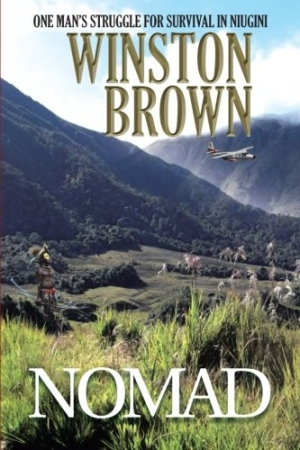
Nomad
The beauty of an exotic locale, the drama of business intrigue, and the fascinating life of a pilot should provide a solid foundation for a compelling novel. Winston Brown includes all of these elments in Nomad, a story largely drawn from his own life experiences.
Brown’s tale explores the difficult choices faced by entrepreneurs—both in day-to-day decisions and in those risky opportunities that can make the difference between success or failure—and reveals the highly competitive nature of air service in developing countries. It also provides a glimpse of what it is like to live and thrive in a country just beginning to embrace the modern business and political world.
Nomad tells the story of John “Hairy” Richards, a civil aviation pilot who, with his young family, starts an airline in Papua New Guinea in the 1970s. To accomplish this, he becomes the first in the world to put the Nomad aircraft to commercial use, which sparks a firestorm of corporate and political intrigue. Hairy must fight underhanded competition while pulling together the right staff, which isn’t easy with competitors stealing them away and pilots sometimes having challenging quirks of their own. Despite frequent challenges and missteps, Hairy builds a powerful company. Just as he begins to fight an attempted corporate takeover, he is brutally beaten and left for dead. In a coma for weeks, it is no longer just a fight for his business, but for his life.
The novel centers around a fresh and interesting subject. Readers may feel inspired to take risks to achieve their dreams and to long for more adventurous lives outside the safe confines of their own cultures. Brown’s tale also puts the reader in the pilot seat by allowing glimpses into the drama of corporate ownership and the pressures of competition.
Unfortunately, Nomad never fully captures this drama. Brown’s writing has some strong moments but tends toward the passive and tells where it should show. For example, readers learn, “The meeting lasted two hours with Hartwig aggressively attacking every suggestion.” Yet the boardroom drama is never explored. The result is that vital opportunities for tension are skipped, such as when one character tells Hairy, “You have done enough to upset both little Hitler and DTs, just by starting this company, let alone stealing half their business. That’s enough for them to bring the heavies in.” From there, the concern is never addressed again. Additionally, while the cover and design of the book are solid, the text needs further proofreading.
Taken along with intrusive moments of sexual intimacy and a lack of heart in some cases (as when missionaries ask Hairy to assist earthquake victims and he only thinks of the business opportunity, never the hurting people), readers will be left with more promise than perfection. Nevertheless, Brown’s novel would be an interesting read for anyone interested in civil aviation, business decision making, or what life is like in another culture.
Reviewed by
Diane Gardner
Disclosure: This article is not an endorsement, but a review. The publisher of this book provided free copies of the book and paid a small fee to have their book reviewed by a professional reviewer. Foreword Reviews and Clarion Reviews make no guarantee that the publisher will receive a positive review. Foreword Magazine, Inc. is disclosing this in accordance with the Federal Trade Commission’s 16 CFR, Part 255.
